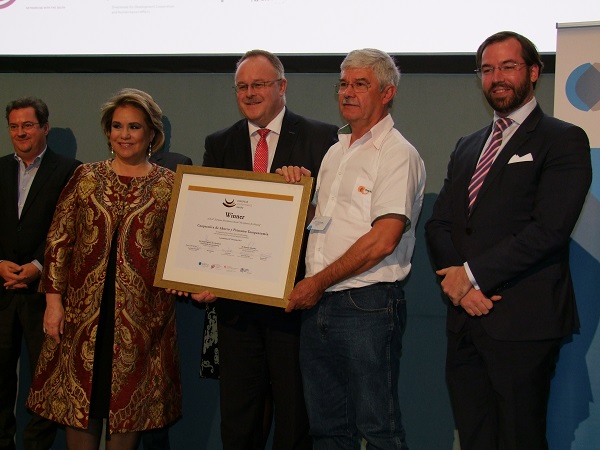
On Thursday evening, the atrium of the EIB in Luxembourg-Kirchberg was the venue for the 8th European Microfinance Award which addressed "Microfinance for Housing", with Cooperativa de Ahorro y Prestamo Tosepantomin from Mexico being declared the winner.
HRH the Grand Duchess and the Hereditary Grand Duke, the Minister for Development Cooperation and Humanitarian Affairs, Romain Schneider, and the President of the European Investment Bank, Dr Werner Hoyer, were the special guests in the crowd of over 400 attendees.
Dr Werner Hoyer declred it was a great pleasure to host this worthwhile initiative at the EIB again this year. He confirmed that the EIB has committed €900 million since 2006 to microfinance projects, mostly outside the EU, fostering social inclusion and improving the livelihoods of both direct and indirect beneficiaries. He also referred to the United Nations developemnt goals, to which microfinance offers a solution, and the EU - African Union summit in Abidjan in the Ivory Coast from which he has just returned today.
The winner of the 2016 European Microfinance Award, the Kashf Foundation, presented an update of their work on their winning project "Microfinance and access to Education", offering credit facilities to low-cost schools in Pakistan. The schools also lack access to qualified training, with teacher training financed to improve the overall quality of education offered to the children. They aim to increase the programme to 3,000 schools, thereby affecting directly around one million children. The project also offers a significant social impact as many of the children taught are abused.
The keynote speaker, Ms Leilani Farha, United Nations Special Rapporteur, addressed the large audience on the right to adequate housing and non-discrimination. She congratulated all of the finalists which affect the quality of life of the people they reach. He referred to he work bringing her face-to-face with those marginalised from society; she is often shocked by the world's millions living in poverty and the conditions they endure. She revealed that her work is both inspiring and heartbreaking; "Housing has lost its currency as a basic human right" she stated and added that microfinance for housing can play a positive role, but cautioned that microfinance solutions must find their place in housing strategies to uphold the human rights characteristics.
Each of the three finalists - from Mexico, Peru and Afghanistan - of the 2017 event, and their work, were then presented in short video presentations.
- Cooperativa de Ahorro y Prestamo Tosepantomin (Cooperative Tosepantomin) is a Mexican cooperative that offers housing savings and loans combined with technical assistance to rural clients living in marginalised areas. Notable for its holistic approach to technical support, involving architecture planning, budgetary support and ongoing oversight of building processes, Tosepantomin was also recognised for its outstanding promotion of environmental responsibility through eco-friendly building techniques, recycling, renewable energy and energy efficiency.
- Mibanco is a Peruvian Bank that responds to a national housing deficit, overcrowding and poor quality building by offering three housing products, including a long-term, collateralised mortgage, an incremental home improvement loan and a water and sanitation connection product – all bundled with credit life insurance. Targeting microentrepreneurs and low-income salaried workers, Mibanco is notable for its considerable client outreach, diversity of demand-driven products, and strong partnerships with homeowners associations and construction materials suppliers.
- The First Microfinance Bank (FMFB), Afghanistan, has responded to war, natural disasters and lack of verifiable title with a home improvement loan, provided with construction technical assistance offered through a network of partner experts. Targeting rural clients and focusing on facilitating incremental building and home improvement, FMFB Afghanistan was noted for its focus on providing expert technical support and the flexibility of its loan terms, as well as the particularly challenging context in which it operates.
The winner was presented with €100,000, with the other two finalists both receiving €10,000 each.
The event was concluded by a networking reception.








